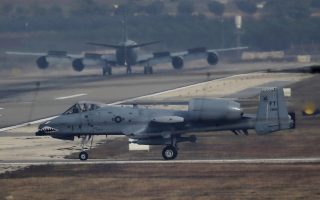Turkey violates US law when its F-16s fly over the Aegean

Every year the United States enacts a law titled the National Defense Authorization Act (NDAA). It sets forth a comprehensive legal framework for the armed forces as well as measures for national and international security. The NDAA for 2020 became law on December 20, 2019. Among its voluminous provisions, Turkey is removed from the F-35 program as a sanction because it has purchased the Russian S-400 air defense system. The US Congress has determined that this purchase violates the legal terms and conditions with which Turkey must comply in order to participate in the F-35 program. Further sanctions may be imposed on Turkey if it deploys the S-400s.
Ironically, the US Congress ignores a violation of US law which Turkey has been systematically committing for almost two decades. For years, the US has sold F-16s and upgrades to such fighter jets to Turkey. At least since 2004, when Recep Tayyip Erdogan became prime minister and now president of Turkey, Turkey has deliberately and on an almost daily basis sortied its F-16s toward the Aegean Sea. Since 2017, there have reportedly been thousands of such sorties. Usually these sorties violate the Athens Flight Information Region (FIR) and internationally recognized Greek airspace over the Aegean Sea. Each such sortie violates the United Nations Charter and international law when the F-16s enter the Athens FIR and Greek airspace.
However, before the sorties even violate the UN Charter and international law, they violate US law. Among the conditions under which the US sells F-16s and arms to Turkey and other nations is that they must be used only for legitimate self-defense. The concept of self-defense has existed in domestic law and customary international law since ancient times.
A person has the inherent right of self-defense if another person acts in a way that places the former in fear of imminent death or injury. At the international level, a nation lawfully acts in its legitimate self-defense when another nation acts against the former nation in an aggressive or hostile manner. The magnitude of the force which the aggrieved nation can use must be proportionate to the magnitude of the force which the aggressor nation deploys.
It is the act of ordering the F-16s to fly toward the Athens FIR and Greek airspace which violates US law of legitimate self-defense. Whether or not the F-16 actually enters and violates the Athens FIR or Greek airspace is irrelevant. Neither Turkey nor any other nation nor any international organization has ever alleged or even implied that Greece acts in an aggressive or hostile manner such that Turkey must invoke legitimate self-defense. Greece has never deployed its military to act against Turkey in any way by which Turkey could even remotely maintain that its sorties are legitimate self-defense. Consequently, Turkey violates the terms under which the US sells the F-16s.
Laws are merely devices which implement policies. The law is simply the vehicle by which the policy takes effect. It is the policy which matters. After the Second World War, generations of US policymakers understood, in varying degrees of wisdom, that diplomacy and international law alone could not adequately confront Soviet aggression. They developed a policy of arming threatened nations so that they could defend themselves, the Vietnam War being an obvious colossal failure of this policy.
The US became and reportedly remains the largest seller and supplier in the world of arms in terms of volume and dollars. To assure that the arms are used in a manner consistent with the policy and not misused, the US laudably requires that US-supplied arms can only be used for legitimate self-defense. The US, not the recipient nation, determines whether or not the recipient nation uses the arms for legitimate self-defense. If the recipient nation does not, the US law requires that sanctions be imposed on the recipient nation.
In the geopolitical context, the nature and scope of legitimate self-defense varies in terms of the history of the affected nations and the particular facts on the ground. However, where the geopolitics are not ambiguous, the policy of using US-supplied arms only for legitimate self-defense must be applied and respected. If not, the policy does not have any meaning in any geopolitical context. In the Aegean Sea, the geopolitics are wholly unambiguous. With its sorties toward the Aegean Sea, Turkey willfully and blatantly violates US law and, therefore, negates the policy which the law is meant to implement. This is the act of an adversary not an ally.
Nicholas G. Karambelas is an attorney and a director on the Board of Directors of the American Hellenic Institute (AHI) in Washington DC.





